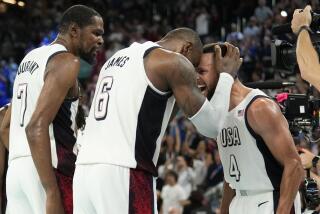The Party Is Finally Over for Steve Lewis : Track: 1988 gold medalist no longer bothered by virus. He is serious about 1992 Games.
- Share via
When Steve Lewis won the gold medal in the 400 meters at the 1988 Olympic Games in Seoul, his coach, John Smith, was both ecstatic and apprehensive. While celebrating, Smith recalled recently, he was struck by the thought, “What do I tell him now?”
After all, Lewis, as a 19-year-old UCLA freshman, already had attained the ultimate goal in his sport, something that Smith had been unable to do almost two decades earlier because of an injury--despite being one of the world’s great quarter-milers.
As it turned out, Smith’s worst fears were realized. There was nothing anyone could tell Lewis, not even his best friend and training partner, Danny Everett, who won the bronze medal at Seoul.
“I never said, ‘Steve, you’re blowing it,’ ” Everett said. “I’m not a parent. But there were a lot of times I would give him a look, like, ‘You’re here to run, not to party.’ ”
Although Butch Reynolds’ world record of 43.29 seconds in the 400 meters might have been out of reach at the time, Lewis seemed determined to set another for the longest victory celebration. His party lasted for almost two years.
“Wherever there was action, that’s where I had to be,” he said.
During that time, he was taking a full load of courses at UCLA, competing for the Bruin track team, spending his summers on the international circuit in Europe and getting to know all the hot spots from Arizona to Zurich.
Naturally, his body rebelled. His season was cut short in 1989 by injuries and in 1990 by still more injuries and a mysterious virus that required three relay teams of doctors to cure.
“Most people have their trials and tribulations and then achieve their glory at the Olympic Games,” Lewis said before a workout last week at UCLA’s Drake Stadium. “Me, I did it the opposite. When I look back, I don’t think I was mature enough to handle the success I had.”
Now, with his collegiate track days behind him and the World Championships this summer in Tokyo and the 1992 Olympics in Barcelona in front of him, Lewis, a wiser 21, insisted that he finally is serious about his sport, which also became his career when he decided to forgo his final year of eligibility at UCLA.
He, Everett and two of their Santa Monica Track Club teammates will compete in the 1,600-meter relay this weekend in the Mt. SAC Relays at Walnut, and if he feels up to it, he might run the open 400 meters for only the 15th time since he won the gold medal.
The remarkable thing about Lewis’ two lost seasons, if they can be called that, is that he won 13 of 14 races. Running in only four finals last season, he won all of them, including the Pacific 10, NCAA and TAC championships.
“He had a bad season and still won three major championships and ran 44.75,” Smith said. “All these things happen to him and he still succeeds. That shows you what an amazing athlete he is.”
But not even Lewis believed he could overcome a virus contracted last summer. Everett and Reynolds might not have been able to run him down in Seoul, but the virus did. Lewis said he thinks it came from drinking the water in Paris, which might be the reason water is not the beverage of choice among the French.
He had a high fever during the day, chills at night and lost 20 pounds before a doctor, the 13th who treated him, finally prescribed the right medicine. But it might have been the virus itself that was the best medicine for Lewis.
“Steve was young,” said Everett, a grizzled veteran of 24. “Like a lot of young people, he thought he was immortal. When he got sick, that changed him.”
When Lewis made an appointment with that last doctor, he asked Smith to accompany him.
“He was scared,” Smith said. “He told me, ‘You know, I didn’t know how much I would miss track.’ That’s when I knew he had turned the corner.”
Early in his treatment, Lewis was so insecure that he asked if he could return to the UCLA team for his senior year. But Coach Bob Larsen told him the scholarship already had been given to another athlete.
“I gave up a lot of money, maybe around a million dollars, by going back to UCLA for two years after I won the gold medal, but it was comfortable because there wasn’t as much pressure,” Lewis said.
“I thought maybe I needed to be in that environment for another year, that I should test myself again at the college level. I didn’t know whether I could come back as a world-class athlete. I guess I’ll find out soon enough.”
Smith said he is not concerned about Lewis, particularly since he decided to continue working toward a history degree that he plans to have before going to Barcelona.
“I want him to work smart, start slow and not put too much pressure on himself,” Smith said. “He doesn’t have to be all the way back yet. But before the end of the summer, I think you’ll see him strut his stuff. When he puts some career races together over the next couple of years, he’s going to be awesome.”
More to Read
Go beyond the scoreboard
Get the latest on L.A.'s teams in the daily Sports Report newsletter.
You may occasionally receive promotional content from the Los Angeles Times.






